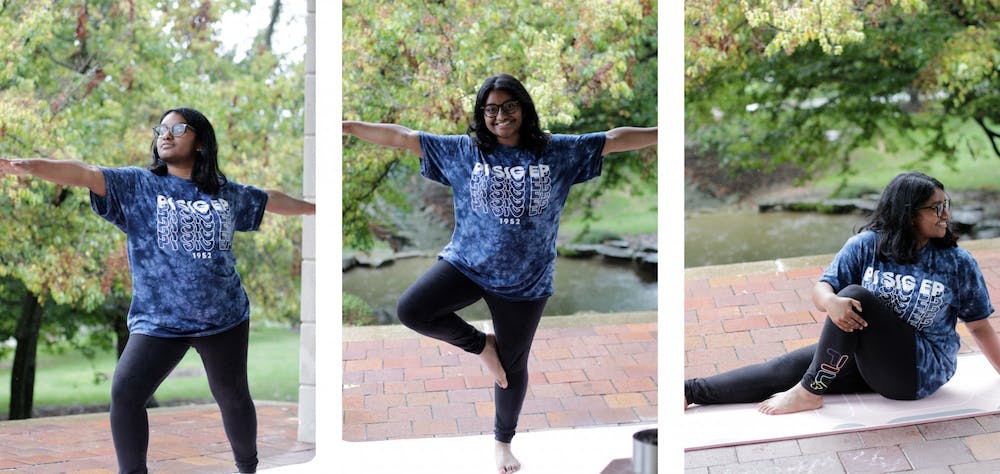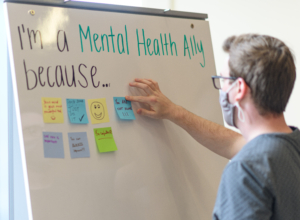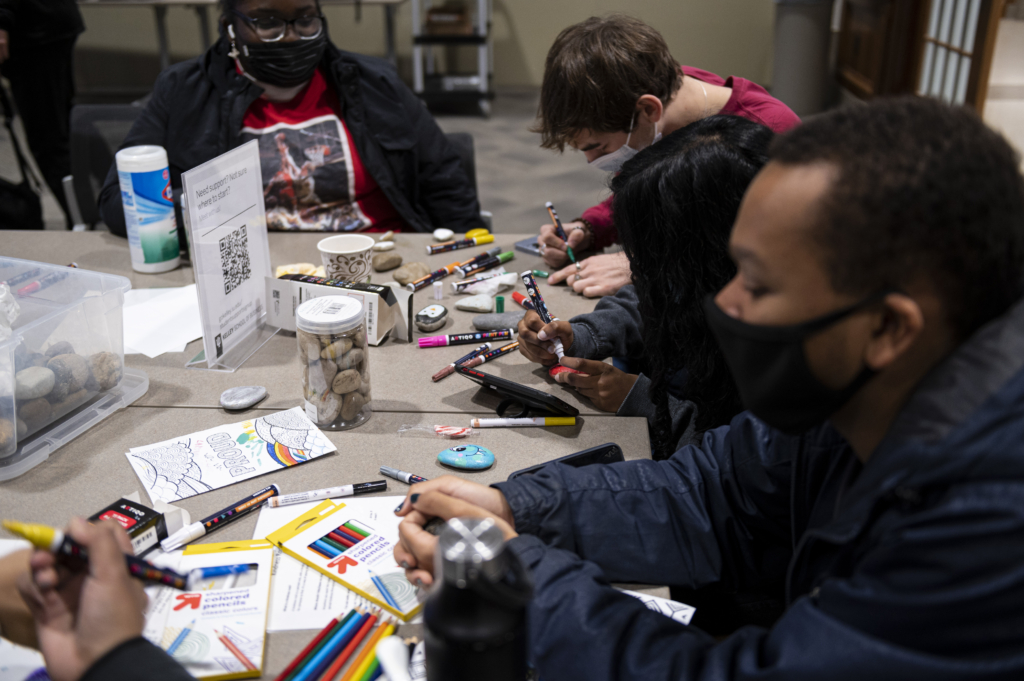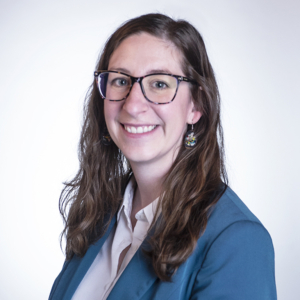
Kelley student Haripriya Jalluri demonstrates yoga poses learned in School of Public Health I190: Yoga 1 on Sept. 22, 2021, outside of Herman B Wells Library. Indiana Daily Student photo by Ashlyn Johnson
As a sophomore at Indiana University’s Kelley School of Business, Haripriya Jalluri carried to class a thick pink yoga mat, squeezing it between the rows of lecture halls in Hodge Hall. Think of it as her “textbook” for another class on her packed schedule: Yoga 1.
“I never thought I would be this grateful to have 50 minutes between lecture classes where I could relieve all the built-up tension, anxiety and stress from having to learn about financial accounting in a crowded room,” the Information Systems and Business Analytics major and psychology minor wrote in a story for the Indiana Daily Student.
“But that is just one benefit of taking an on-campus yoga class midday — you are forced to have a mental reset.”

Haripriya Jalluri
That semester, fall 2021, was the first she’d get to experience in-person classes at Kelley after the pandemic closed the IU campus her freshman year. In building her class schedule she asked herself an important question: “What can I do to best help my mental health this semester?” The one-credit Yoga 1 class offered through IU’s School of Public Health was not merely a way to get a break between rigorous Kelley courses, but it allowed her to practice what she preached: Throughout the pandemic, she became a vocal advocate for mental health and balance in college life.
Now a junior at Kelley, Jalluri is the Professional Fraternities Delegate on the school’s Mental Health/Balance Task Force and also serves on the operations/logistics committee. Last spring, she served as the student lead for Kelley’s Failing Successfully Summit. She founded a Director of Wellness position for her professional business Fraternity, Pi Sigma Epsilon, and is currently working to create a more inclusive environment at IU’s student-run newspaper where she works as the creative director.
“I think what distinguishes this program is that the Mental Health Task Force is comprised of students for students. It’s made of students who are fighting to implement cultural change not only for themselves but also for their friends in organizations, for their classmates and for future Kelley students,” Jalluri tells Poets&Quants.
“On the task force, each student represents a different area of the Kelley student body, whether that is a certain office of Kelley representing students or an entire class of students. Each voice in the task force is equally heard and supported, and our faculty advisors – Kelly Higgins and Keyandra Whiteside – are there to guide us and help us implement our ideas.”
UNDER THE RADAR: KELLEY’S CULTURE OF CARE
Other business schools have mental health and balance resources for students, often resourced through the university’s overall health center. Kelley is building them directly into its Culture of Care. It is likely the first, and perhaps only, major ranked business school to create a position for a dedicated student wellness professional embedded into its leadership.
Kelly Higgins, a licensed clinical social worker, is the school’s first Director of Student Support, a position that arose from student feedback via the Mental Health/Balance Task Force. She has a Master’s in Social work from Washington University in St. Louis and an MBA from Alliance Manchester Business School in the United Kingdom.
“I bring mental health expertise, but I also have a really good sense of the sort of challenges students are facing in a rigorous business program like Kelley,” Higgins tells Poets&Quants.

A students participates in Kelley’s Wellness Kickoff in August 2021. During the academic year, Kelley students find programs and resources to manage stress, build resiliency, and cope with challenges. Courtesy photo
The purpose of P&Q’s Under The Radar series is to give attention to innovative but overlooked programs in undergraduate business education. With more than 10,000 undergrad students enrolled this fall, 20 majors, four minors, and a certificate in business foundations, Kelley School of Business is hardly overlooked. It ranked 11th in our 2022 ranking of undergraduate business programs. More than 700 companies actively recruit its graduates, and it has a 97% placement rate for jobs or graduate school three months after graduation.
But its innovative and novel approach to supporting students beyond academics – things that are harder to advertise on a school website or in a ranking – deserves our Under the Radar recognition. (See previous Under the Radar features on University of South Florida, Bucknell Freeman, and University of Delaware.)
“There is a stigma around being a business major across a lot of universities, especially IU. A lot of people don’t realize, or care, that business classes are extremely difficult, and our undergrad population goes through a lot. The times they need support are often the times they are marginalized and made fun of,” says Kelley junior Lauren Piera, president of Balance at Kelley, a mental health awareness club.
“Our work is important because we provide them a place to relax, time to breathe, and let them know that everything is – and will be – okay.”
A BALANCE JOURNEY WITH MULTIPLE TOUCHPOINTS
Under the umbrella of Student Support, Kelley offers a series of events, programming, and clubs dedicated to balance and mental health. It also oversees inclusion programming for LGBTQ+, women, and others through the Kelley Office of Diversity Initiatives.

Kelley undergrads make crafts during Balance Week before finals. The week encourages students to take a break from end-of-the-semester stress. Courtesy photo
The first contact a student will have begins even before they arrive on the IU campus. The Kelley-to-Kelley Mentoring Program connects more than 1,200 incoming freshmen to juniors and seniors for the purpose of easing the transition to a large university. They are matched by interests, the issues that most concern them about coming to college, and personality – not by major or academic interest.
“One of things we know is a major protective factor against the development of a mental illness is connection – having people who they can rely on and go to for support,” Higgins says. “The matching has nothing to do with majors, career paths, or academics because we offer plenty of other support in those areas.”

Kelly Higgins
Higgins also opens her calendar to students and invites them to make one-on-one appointments for things like wellness coaching, routine setting, or just to discuss issues they are struggling with. It’s not therapy, but Higgins can recommend clinical care services on campus or other support resources as needed. Students can make as many appointments as they think they need.
Higgins works with faculty to educate them on Kelley’s support resources or even to offer language for answering student questions. She’s planning more formal faculty education around mental health for this November.
“Students have a tremendous amount of respect for professors, so when professors are talking about these things, it makes a really big impact. They might listen a little bit more when their finance professor is talking about this than when that social worker is talking about it,” Higgins says.
“Right now, students are already talking to faculty about these issues. Students are more open about raising their hands and initiating conversations, so we point faculty to the resources that can help them with these conversations. They don’t have to be student therapists, but they can point students to the resources that can help.
“The data says that students and people of this age group are really struggling right now, and I think the pain points of business students are different. Their personalities are different, what’s expected of them is different. I think business schools – much like other high-pressure professional schools like engineering and medicine – have real outcome-based pressure that might not be replicated in other places,” she says.
NEXT PAGE: Failing successfully + Impact outside the classroom











Questions about this article? Email us or leave a comment below.